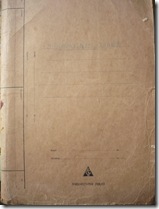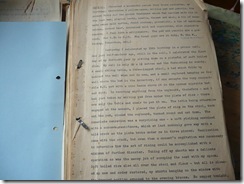Out from 5.25 to 6.05. Walk, run round and PE as usual in silence.
_____________
Altogether, the show bills specified about 20 items and were rather apt to give the impression that the company consisted of at least as many artists. But even if we were only six, we certainly did the work of 20! It was a case of rapid fire and quick change all the time and the whole show went with a swing and tempo which I have seen equalled, but never bettered, since. Although I may be somewhat biased regarding the quality of our entertainment, the vociferous applause which was invariably our portion (when the audience turned up) would seem to have confirmed my own opinion that it was a rattling good show. Or it may only have been that the country lads and lasses were easily pleased with anything in the way of novelty, such as we certainly brought to them!
Thelma, the Wonder Child (little Gladys Stratton), assisted by Professor Montague, performed an act of telepathy and clairvoyance. She sat in the middle of the platform, blindfolded, while Monty went to and fro among the audience selecting a watch here, a brooch or a coin here, and asking Thelma to describe the article, tell the time from the watch or the date of the coin etc. The whole thing was, of course, based on a system of key words which were contained in the questions which Monty asked. For instance, ‘What is this?’ would mean signify a ring, while ‘What have I here?’ indicated a watch and so on. Similarly, with time and dates the numbers were conveyed in questions. For example, ‘Can’ stood, say, for 10, ‘tell’ for 2 and ‘now’ for 5, so that when the question was put, ‘Can you tell me now what the time is'?’ the answer was, of course, 10.25. The question sounded quite natural, such as ‘Tell me the time on this watch’; ‘Can you say what time this watch shows?’; ‘What is this?’; ‘Now what have I in my hand?’ and so on, and the effect must certainly have been mystifying and entertaining to the uninitiated audience. There was nothing very wonderful in the whole business but little Gladys was certainly a wonder child as far as her memory was concerned. How I have envied that child then and since for her power of memory and never more so than on one occasion when, Gladys being indisposed, Monty in an ill-omened moment, insisted that I should act as her substitute in order to fill the bill. Ye Gods, how I swotted at the code the whole of that day! And imagine my feelings when, having been introduced to the audience by Monty as the brother of the famous Thelma and also gifted with clairvoyant powers, I was placed on the chair, blindfolded, and left all on my lonesome in the middle of the stage. On being blindfolded, not only the lights in the hall were obscured, but every other light, mental or otherwise, deserted me. I have not been blessed with a good memory and realising that even then, I was in a state of sheer funk as well. The torture began, but to my shame, but none the less to my devout relief, it did not, could not, last long. I believe I answered the first two or three questions correctly, simple things such as a ‘ring’, a ‘brooch’, etc. However, when it came to the date on a coin, the last remnants of reason fled and everything went blank. And there I sat, bathed in a sort of cold perspiration, dimly aware of Monty’s voice asking the same question two or three times, giving that up and going on to something else in a desperate effort to save the situation. But all in vain. There sat the clairvoyant brother of Thelma, a complete dumb dud. Poor Monty made the best of it but I had let him down badly and he could do no more than return to the stage and lead me away. Monty was one of the best natured souls alive, but I can find it in my heart to forgive him if he suffered from some slight homicidal tendency that evening.
In this way, Monty was quite a character. He was, I suppose, about 50 when I knew him and had been, I believe, connected with the ‘profession’ in a rather third rate capacity, I imagine, most of his life. He was a fair enough conjurer but confining himself to the stock tricks of the trade and quite a passable ventriloquist, working with the usual dummy. The only bit of ‘patter’ between Monty and his dummy which I can recall went as follows:
Dummy: Who was that girl I saw you with last night?
Monty: That was my fiancée, George.
Dummy: Oh what a face – what a dial!
Monty: (Slap!) Shut up, you impudent rogue! Besides, George, you must remember that beauty is only skin deep.
Dummy: Then, for Heaven’s sake, skin her!
(Slap!)
Monty also had another act which he called ‘Papergraphy’. This was carried out with nothing else than a fairly big piece of wrapping paper, folded somewhat after the fashion of a Venetian blind, which by manipulations was made to represent a chair, a basket, a fan, etc. Rather clever and entertaining, too. Monty was fairly heavily built man and somehow gave the impression that his legs were somewhat of inadequate strength to carry the upper structure. he did not exactly walk – he stumped. His shoulders were slightly bent as though he carried a load – which I have no doubt he did, poor old chap. Failure was written all over him and even his face had a battered look about it which reminded one of an ex prize fighter run to seed. He always smoked Woodbines but, strangely enough, I cannot remember ever having seen Monty with a whole, or even a half cigarette, in his mouth. It was always a stump of about half an inch long in the corner of his mouth, the smoke from which crept continually past his nose into his left eye, which was always half closed and tearful in consequence. That cigarette stump has always puzzled me because Monty smoked 50 to 60 Woodbines a day and the whole cigarette must have existed. But, as I have said, I never saw one. Monty was clean shaven and used a good old ‘cut throat’ razor. The sight of Monty shaving was one which filled me not only with respect (I myself had nothing to shave at that time) but with a feeling akin to awe. He never used a mirror and used to wander all over the place scraping away the perpetual cigarette stump in the corner of his mouth and his face all screwed up from the combined effects of the smoke and the operation. He was one of the kindest hearted men, easy going, taking the bad with the good in an admirable philosophical spirit – a regular old trouper of the best kind, and a very real asset in a small ensemble such as ours.





